Adopting Zero Trust
Adopting Zero Trust offers an ongoing conversation that elevates cybersecurity conversations that encourages you to rethink how you build strategies, defend against threat actors, and implement new technology. We go beyond the millions in marketing budgets fueled by VCs, and chat with practitioners like you who want to make a difference (or hack the planet, which ever happens first).
Episodes
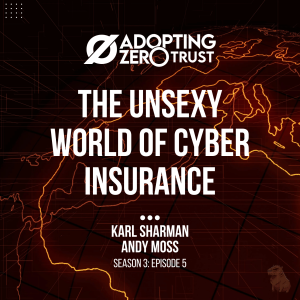
Thursday Apr 11, 2024
Thursday Apr 11, 2024
Season 3, Episode 5: Cyber Insurance may not be the sexiest topic, but it’s an important piece of any mature cyber program. We chatted with a lawyer and a VC who share their perspective.
Catch this episode on YouTube, Apple, Spotify, Amazon, or Google. You can read the show notes here.
There are many aspects of cybersecurity that are not classified as cool or sexy, but every component plays a role in securing people, data, and businesses. One particular aspect that is often seen as a necessary evil, even more so than policies and documentation, is cyber insurance. On one hand, you have a system that forces backstops to protect the organization in the event of an incident; on the other, requirements to not only remain insured but reduce premiums encourage businesses to invest more in securing the business.
This week, we chatted with Karl Sharman of Forgepoint Capital and Andy Moss of Reed Smith to better understand the role cyber insurance plays today.
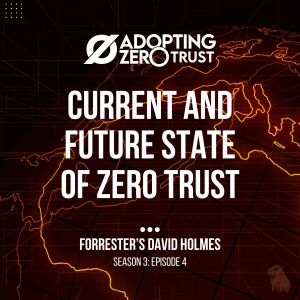
Thursday Mar 28, 2024
Thursday Mar 28, 2024
Season 3, Episode 4: Forrester Principal Research Analyst on Zero Trust, David Holmes, shares his perspective on the current and future state of Zero Trust.
Catch this episode on YouTube, Apple, Spotify, Amazon, or Google. You can read the show notes here.
Zero Trust is a concept, a strategy, a philosophy, and, for some poor souls, a solution you can buy (it’s not). Through our three seasons, we have heard about MVPs, learned from the godfather of Zero Trust, been aided by Dr Zero Trust, and even heard from current and former federal officials about their stance on the concept. However, we have yet to touch on the current an future state of Zero Trust, and for that, we look to Forrester Principal Research Analyst on Zero Trust, David Holmes.
Prior to joining Forrester, David spent a decade researching, writing, and speaking about cybersecurity topics for network and application security vendors. Before entering the cybersecurity space, he was a C/C++ software developer specializing in authentication and authorization, network protocols, and cryptography. So you could say he knows a thing or two about the subject at hand.
TL;DR
Holmes explains that Zero Trust's core principles remain unchanged: all networks are untrusted, least privilege access is enforced, and everything is inspected and monitored.
The COVID-19 pandemic has accelerated the adoption of Zero Trust as organizations were forced to work remotely and faced VPN overloads.
David shares his perspective on the current and future state of Zero Trust, as well as areas he would like to see the vendor market seek to solve.
The biggest example of successful Zero Trust implementation is Google. Since implementing Zero Trust, no major breaches have been reported.
In addition to Google, there is a smaller organization that successfully implemented Zero Trust using existing tools, indicating that Zero Trust can be achieved without significant financial investment.
However, achieving full Zero Trust is a journey rather than a destination, similar to cybersecurity itself. It's an ongoing process of adaptation and improvement.
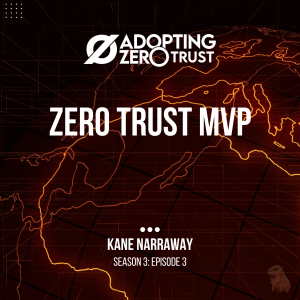
Thursday Mar 07, 2024
Thursday Mar 07, 2024
Season 3, Episode 3: Canva’s Head of Enterprise Security, Kane Narraway, discusses how to deploy a Zero Trust strategy in under a year.
Catch this episode on YouTube, Apple, Spotify, Amazon, or Google. You can read the show notes here.
This week on Adopting Zero Trust (AZT) we chat with Kane Narraway, the head of Head of Enterprise Security at Canva. Prior to his current role. Kane has been adopting Zero Trust for around a decade, starting with the UK government, and later to organizations like Shopify, Atlassian, and BT. You could say he’s seen a thing or two, and has absolutely been part of the evolutions occurring within cybersecurity and Zero Trust. Kane walks, crawls, and runs us through how he has built out Zero Trust strategies and recommends where organizations get started.
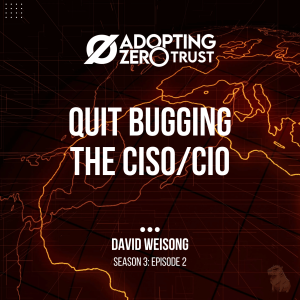
Thursday Feb 08, 2024
Thursday Feb 08, 2024
Season 3, Episode 2: In our conversation with Energy Solution’s CIO David Weisong we chat about how new processes, technology, and budgets are formed.
Catch this episode on YouTube, Apple, Spotify, Amazon, or Google. You can read the show notes here.
It’s a mystery as old as time: the cybersecurity and technology budget and acquisition strategy. How are they formed? How are these projects prioritized? How are internal teams proposing changes and asking for new dollars (and likely not getting them)? This week, we chat with someone at the heart of the matter for their business who walks us through how they build their security and information roadmap, or in what I lovingly call: quit bugging the C-suite.
David Weisong is the CIO for Energy Solutions and has a background in software development, DevOps, and managing IT functions, which makes him the perfect candidate to properly discuss the ins and outs of cybersecurity and IT roadmaps.
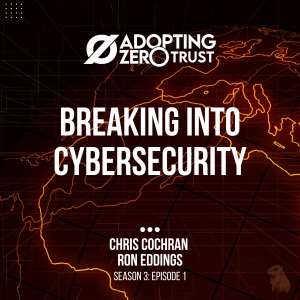
Thursday Jan 18, 2024
Thursday Jan 18, 2024
To start the new season, we are joined by Hacker Valley Media’s Ron Eddings and Chris Cochran, who discuss breaking into cybersecurity and the role storytelling plays.
A new year, a new season, and plenty of new threats to impact the world of cybersecurity. This week we break from our typical conversations about modern cybersecurity strategies and concepts to focus on one of the most important aspects of our space: people.
People are the why behind what we do. We protect, support, and educate them about the dangers that lurk online. However, cybersecurity is also driven by people, and for new entries into our field, it can feel nearly impossible to break in. This week we turn to two experts who lived the lives of practitioners and shifted their energy toward telling amazing stories that drive our industry forward. This duo has built a masterclass on what it means to be in cybersecurity and has guided countless people through every nook and cranny.
And with that, we’re excited to introduce Hacker Valley Media’s Ron Eddings and Chris Cochran who discuss breaking down the barriers to cybersecurity and why practitioners need to invest in soft skills.
Read more at adoptingzerotrust.com
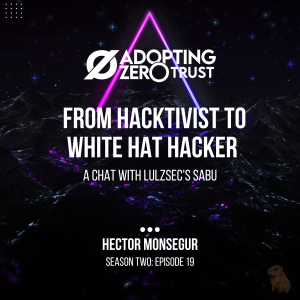
Thursday Nov 30, 2023
Thursday Nov 30, 2023
Catch this episode on YouTube, Apple, Spotify, Amazon, or Google. You can read the show notes here. PS, we're giving away a Flipper Zero on our site as a little season finale gift. Check out details on our site.
You know what they say, you save the best for last. As we wrap season two of Adopting Zero Trust, we take a shift from our standard conversations about modern cybersecurity strategies and look back at some of the history that got us to where we are today.
This week we chat with Hector Monsegur, Co-Founder of LulzSec, and current Director of Research for Alacrinet, who discusses his journey from hacktivism to white hat pen testing.
In May of 2011, a series of cyber attacks swept the globe. Starting with Fox News, after a broadcaster called rapper Common ‘vile’, then an attack on X Factor (yes, the show Joe Rogan used to host) leaking contestant data, and through to taking down the Sony Playstation network. A, at the time, black hat hacking group was founded and picked off targets for laughs (lulz) rather than financial gain. Among the group was co-founder Hector Monsegur, better known by his alias Sabu, who shaped the movement into cause-based cyber attacks or hacktivism.
But the story starts well before the formation of Lulzsec, and before the FBI knocked on Hector’s door. It stretches back to a time when there weren’t resources for people to learn how to hack, pen test, and become cybersecurity practitioners didn’t exist, unlike the endless amount of certs and higher education programs that exist today.
Key Takeaways
The evolution of one's ethical stance: Hector's journey highlights the importance of questioning and reassessing one's actions and beliefs.
Collaboration and collective impact: Working together can amplify efforts and create positive change, even in the realm of cybersecurity.
Balancing curiosity and responsibility: Exploring technology and hacking skills should be accompanied by a sense of responsibility and ethical considerations.
Editor’s Note
The season finale of AZT is here, and we couldn’t have found a more interesting way to wrap things up. Hector has such a unique and storied past, and we can’t recommend his own series enough. The very agent who knocked on his door joins him as the cohost on Hacker and the Fed.
We also can’t thank you, our listeners, enough for another year of the show. Neal and I do this as a passion project first and foremost, but as we seek to attract harder-to-reach guests, we are also building in some ad opportunities. We are ensuring that doesn't impact how we highlight the practitioner's perspective on modern cybersecurity strategies, too.
Speaking of growing, that other podcast I mentioned last episode? Mastering the Art of Failing can now be found at failingpod.com or on your favorite podcast app. The pilot series will highlight people who have found success in their lives, but not without some challenges along the way. Our first guest, Glen Hellman, was part of several successful exits… and quite a few not-so-successful flops. As the series progresses we’ll expand beyond just career-oriented stories and dig into physical, mental, and other states of pushing boundaries and levels of success.
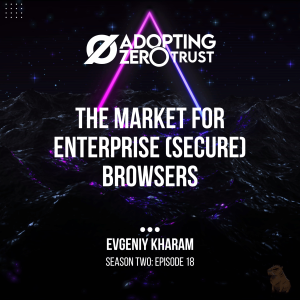
Thursday Nov 16, 2023
Thursday Nov 16, 2023
Season two, episode 18: Evgeniy Kharam, a founder, CISO, architect, and podcast producer discusses the rise of Enterprise (Secure) browsers.
You can read the show notes here and subscribe to updates.
In the latest episode of AZT, Evgeniy Kharam, a founder, CISO, architect, and podcast producer, joins the discussion to talk about the rise of Enterprise (Secure) browsers. The conversation explores the importance of browser security and its relevance to the Zero Trust framework.
Key Takeaways
The birth of the enterprise browser - Remote Browser Isolation: Evgeniy explains the concept of remote browser isolation, which creates a layer of separation between users and potentially harmful websites. By browsing through a remote browser, users can mitigate the risks associated with malware and other online threats.
Customized Browser Profiles: The conversation delves into the idea of using customized browser profiles to enhance security and control access. By providing contractors or temporary workers with specific browser profiles, organizations can ensure that only authorized individuals can access certain applications or data.
Managed Device and Compliance: The discussion highlights the trend of using managed devices and the impact on compliance requirements. With the ability to enforce the use of specific browsers through Mobile Device Management (MDM), organizations can strengthen security measures and simplify compliance audits.
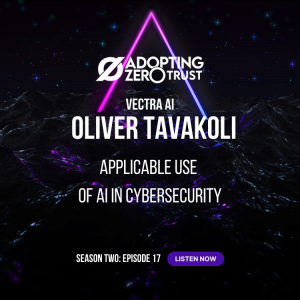
Thursday Nov 02, 2023
Thursday Nov 02, 2023
Catch this episode on YouTube, Apple, Spotify, Amazon, or Google. You can read the show notes here.
The word AI, much like Zero Trust, has come with a lot of baggage in the past few years. It’s a term that’s been misused, slapped on the front of startups’ overpriced booths at RSA and Black Hat, and it feels like every cybersecurity product under the sun now supports it in some flavor or fashion. It's the same cycle we’ve been in the past, but this time everyone is jumping in. This week we are getting in front of the bandwagon and chat with a pioneer in the cybersec AI space who has seen how the technology has been evolving over the past decade, Oliver Tavakoli, the CTO of Vectra AI.
“My contemporaneous definition of AI at any given moment in time is there's got to be enough pixie dust in it for people to view it as somewhat magical; so that's my incredibly technical definition. I'd say over the past 10-15 years, that is typically meant neural nets-that has those have been a stand in-and and obviously, neural nets can be used for discrimination [As opposed to a generative AI model]. Again, the example of cat (You search “Cat” on Google images, and it returns results that show images, in theory, of only cats) is an example of how they can be used in a generative sense, which is really the latest revolution that you see. And then the other thing is how broadly applicable they are and how well read they are.
Tavakoli’s definition of AI provides the context for how AI is primarily applicable today in cybersecurity. But, in the past, typically these concepts were held back by technology. There is also a stark difference between what has been referred to as AI, or a discriminative AI model, and what is most popular today, or generative AI.
It turns out in these large language models, as you make them bigger, there was always kind of the question of if you make them big enough. Will they just plateau or will they take off? It really wasn't a foregone conclusion that if you made them big enough they would take off, but it was a bet that was placed and a bet that turned out to have some merit to it.
And that is the crux of today’s interview: what was and will be the past and future impact of AI on cybersecurity?
Key Takeaways
AI plays a significant role in both offensive and defensive cybersecurity strategies.
Threat actors use AI to enhance their attacks, making them more believable and harder to detect.
Defensive uses of AI include improving workflow and making SOCs more productive.
Organizations must always assume that compromise is possible and focus on minimizing the impact of breaches.
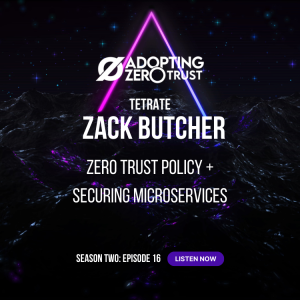
Thursday Oct 19, 2023
Thursday Oct 19, 2023
Season two, episode 16: Zack Butcher discusses building upon NIST’s Zero Trust policies and standards, and ZT’s influence on a service mesh as it relates to microservices.
Catch this episode on YouTube, Apple, Spotify, Amazon, or Google. You can read the show notes here.
There are several guiding concepts that make it easier for organizations to build a Zero Trust strategy. The first that typically come to mind come from CISA and NIST. These core elements, ranging from the five pillars through to building a ZT architecture, offer a vendor-neutral path towards removing implicit trust. Organizations like CSA also do a great job of expanding upon this knowledge with more contributions from technology and service providers. This week, we take our first step towards understanding what goes on behind these policies, standards, and recommendations, and for that we have a well-equipped guest to walk us through it.
Zack Butcher is one of the founding engineers over at Tetrate, a vendor that provides a consistent way to connect and protect thousands of individual microservices and deliver Zero Trust security operations across any environment. They also have their roots stemming from a team that worked at Google, which many of you are likely familiar with their connection to Zero Trust through BeyondCorp. However, he is also the co-author on NIST special publication 800-207A. If that looks familiar, it’s because it’s an expansion of the earlier mentioned core NIST resource, 800-207.
NIST SP 800-207A builds upon that core architecture piece and hones in on access controls in cloud-native applications in multi-cloud environments. That is a bit of a mouthful, so here is Zack on what you need to know.
When we talk about Zero Trust at runtime, there's a lot of FUD and a frustrating amount of FUD in the in the marketplace and a lot of vendors claiming certain things are Zero Trust and not.
And you know, in that landscape, I wanted to really kind of push for people to have a very clear definition of Zero Trust at runtime, and it's a minimum definition. Let me be clear. You can do a whole lot more than what we talk about in the SP, but I try and give a very, very simple minimum definition. And that is five policy checks at runtime, and we call that identity based segmentation.
Butcher also co-authored NIST SP 800-204A that focuses on building secure microservices-based applications using service-mesh architecture. So this week, Neal and Butcher ran down the rabbit hole of expanding upon these core Zero Trust resources, implications of a more secure environment at runtime, and identity-based segmentation.

Thursday Aug 31, 2023
Thursday Aug 31, 2023
Season two, episode 15: We talk ZT History and API security with the godfather of Zero Trust, Dr Zero Trust, and Richard Bird.
Catch this episode on YouTube, Apple, Spotify, Amazon, or Google. You can read the show notes here.
In the past few years, supply chain attacks and their impacts have or will soon overtake that of the damage done by ransomware. It’s of no surprise then that APIs are a critical attack vector that threat actors like to exploit, yet many organizations do not have a good understanding of how many doors they have running into their data.
This week we chat with the godfather of Zero Trust, Dr. Zero Trust, and a chief security officer about the current state of API security maturity. Considering our guests, we, of course, also took the opportunity to chat a bit about Zero Trust's history.
This week we have three very special guests:
John Kindervag, the creator (godfather) of Zero Trust
Chase Cunningham, AKA Dr Zero Trust, and the now VP of Market Research for G2
Richard Bird, Traceable AI’s Chief Security Officer
Key Takeaways
Like any other cybersecurity concept, APIs must have an asset inventory
There is enough margin of error tied to the intended use of APIs that require continuous monitoring/verification
There is a current maturity gap associated with securing the use of APIs in the name of speed and innovation, and often there is not a well-established owner
Editors Note
We will be taking a publishing break for the month of September as my daughter has arrived, and I will need to catch up on all the sleep I can get. We should be back in October and run through until the holiday break before we wrap season two. I’m also working on a few experimental podcast series during my parental leave, so stay tuned. At least one in particular should be of interest to our audience here. Also, if you work for a cybersecurity org and are interested in launching a podcast, slide into my inbox if you need a hand.







